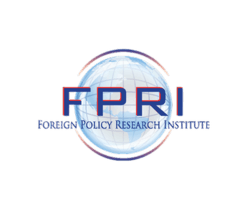Foreign Policy Research Institute
The Foreign Policy Research Institute (FPRI) is an American think tank based in Philadelphia, Pennsylvania. By its own description it is "devoted to bringing the insights of scholarship to bear on the development of policies that advance U.S. national interests."
 | |
| Abbreviation | FPRI |
|---|---|
| Formation | 1955 |
| Type | Public policy think tank |
| Headquarters | 1528 Walnut St, Ste 610 |
| Location | |
Key people |
|
Revenue (2017) | $2,837,600[1] |
| Expenses (2017) | $2,370,400[1] |
| Website | www.fpri.org |
The institute conducts research on geopolitics, international relations, and international security in the various regions of the world as well as on ethnic conflict, U.S. national security, terrorism, and on think tanks themselves. It publishes a quarterly journal, Orbis, as well as a series of monographs, books, and electronic newsletters.
History
FPRI was founded by Ambassador Robert Strausz-Hupé. A native of Vienna, Strausz-Hupé immigrated to the United States in 1923 to work as an investment banker. Alarmed by the 1938 Anschluss, he began to lecture on the dangers posed by Nazi Germany, which in turn led to a teaching position at the University of Pennsylvania in 1940, where he also earned his masters and doctoral degrees.
Dissatisfied with the containment strategy of John Foster Dulles and the Eisenhower administration's foreign policy in general, Strausz-Hupé founded FPRI in 1955 with support from the University of Pennsylvania and the Smith Richardson Foundation. In 1957 publication commenced of the institute's quarterly, Orbis. Among FPRI's notable early scholars were Hans Kohn, William Kintner, Henry Kissinger, James Schlesinger, and Lawrence B. Krause.
For most of its history, FPRI was deeply immersed in the intellectual prosecution of the Cold War. It urged the Western world to unite under the leadership of the U.S. to combat the Soviet Union and international communism. In doing so, however, it drew increasing criticism—notably, by name from U.S. Senator William Fulbright—and became increasingly marginalized from academia; it became independent of Penn in 1970. Ironically, it would also be the start of Strausz-Hupé's twenty-year career as a diplomat, when President Richard Nixon appointed him Ambassador to Ceylon.
Since the end of the Cold War the institute has refocused on other projects: notably, it has identified a special focus on education in international affairs, sponsoring various programs in Philadelphia area schools as well as conferences and seminars for high school and junior college teachers and lectures for the general public.
The U.S.-led War on Terrorism is a central topic of FPRI research. In March 2003, it received a grant from the Commonwealth of Pennsylvania to study sources of potential terrorist threats to the state, and how to manage the risks.
The institute's primary fundraising event is the institute's "Annual Dinner", which typically attracts 400 FPRI members in the Philadelphia area, local news media, and the contributions of various companies, including PECO Energy and Boeing. Past speakers have included such notables as Henry Kissinger, Robert Zoellick, and Walter Russell Mead.
During the 2000s, FPRI has partnered with the Reserve Officers Association, where they have jointly hosted lectures on topics of interest to both the military and the wider international affairs community. FPRI has also begun to hold "salons"—in the French Enlightenment style—in New York City and elsewhere, where they invite local notaries and dignitaries to attend special lectures from the institute's prime scholars.
On February 1, 2012, it named a new president, Alan Luxenberg, a long-time employee and formerly Vice President of the institute.
Research programs
Within the FPRI are the following programs: the Program on National Security (chaired by John Lehman);[2][3] the Asia Program (directed by Jacques deLisle);[4] the Program on the Middle East (directed by Aaron Stein);[5] the Eurasia Program (co-directed by Adrian A. Basora and John R. Haines);[6] the Center for Study of America and the West (founded in 1997, directed by Ronald J. Granieri, and chaired by Walter A. McDougall);[7] the Center for the Study of Terrorism (co-chaired by Lawrence Husick and Edward A. Turzanski);[8][9] and the Think Tanks and Foreign Policy Program (founded in 1989 and directed by James McGann).[10]
Board of Advisors
Members of FPRI's Board of Advisors:[11]
|
|
|
Affiliated figures
Funding
| Funding details as of 2017:[1]
|
Revenue and support as of 2017: $2,837,600 Board Giving (19%) Grants & Contributions (65%) Membership & Partnership (9%) Royalties & Other Rev (7%)
|
Expenses as of 2017: $2,370,400 Publications & Research (58%) Educational Programs (25%) Administration (8%) Development & Outreach (9%)
|
Publications
See also
- Think Tanks and Civil Societies Program (TTCSP)
References
- "Annual Report 2017" (PDF). Foreign Policy Research Institute. Retrieved 14 June 2018.
- "Program on National Security". Foreign Research Policy Institute. Retrieved 2 December 2014.
- "Affiliated Staff & Scholars". Foreign Policy Research Institute. Retrieved 2 December 2014.
- "The Asia Program". Foreign Policy Research Institute. Retrieved 7 January 2015.
- "FPRI Names Aaron Stein Next Middle East Director". Foreign Policy Research Institute. Retrieved 1 March 2019.
- "Eurasia Program". Foreign Policy Research Institute. Retrieved 25 October 2016.
- "Center for the Study of America and the West". Foreign Policy Research Institute. Retrieved 7 January 2015.
- "Center for the Study of Terrorism". Foreign Policy Research Institute. Retrieved 2 December 2014.
- "Affiliated Staff & Scholars". Foreign Policy Research Institute. Retrieved 2 December 2014.
- "Think Tanks and Foreign Policy Program". Foreign Policy Research Institute. Retrieved 7 January 2015.
- "Board of Advisors". Foreign Policy Research Institute. March 2016. Retrieved 17 March 2016.